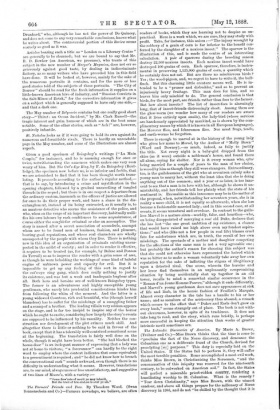Given a good specimen of Boisgobey's writings (" La Main
Coupee," for instance), and he is amusing enough for once or twice, notwithstanding the sameness which makes one very soon weary of him. But The Cat's-Eye Ring, by F. du Boisgobey (Rout- ledge), the specimen now before us, is so inferior and feeble, that we are astonished to find that it has been thought worth trans- lating. It proceeds according to the author's regular method,— that is to say, by introducing a crime and mystification in the opening chapters, followed by a gradual unravelling of tangled threads in the sequel ; but there is in one respect a departure from the ordinary custom, inasmuch as the officers of justice are allowed for once to do their proper work, and have a share in the dis- entanglement, instead of its being entrusted, as it usually is, to an amateur detective who scorns the assistance of the police, and who, when on the verge of an important discovery, habitually nulli- fies his own labours by rash confidences to some acquaintance, of course either the sought-for criminal or else an accomplice. The story is named after a secret association of scoundrels, amongst whom are to be found men of business, fashion, and pleasure, bearing good reputations, and whose real characters are wholly unsuspected by the people with whom they live. There is nothing new in this idea of an organisation of criminals existing unsus- pected in the midst of society ; and in order to render it effective, it requires to be treated (as, for example, by Balzac and Ponson du Terrail) so as to impress the reader with a grim sense of awe, as though he were beholding the workings of some kind of baleful engine of unknown power and capacity for evil. But it is impossible to get up any feeling of this sort in regard to the cat's-eye ring gang, which does really nothing to justify its existence, and was but a weak and inadequate bugbear after all. Both hero and heroine are of well-known Boisgobey types. The former is an adventurous and highly susceptible young gentleman, who rarely lets prudential considerations hinder him from following the whim of the moment. And the latter is a young widowed Countess, rich and beautiful, who (though herself blameless) has to suffer for the misdoings of a smuggling father and a scamp of a brother. The leading villain very seldom appears on the stage, and is far too insipid to inspire any of the horror which he ought to excite, considering how largely the story's events are supposed to be influenced by his rascality. Neither the con- struction nor development of the plot evinces much skill. And altogether there is little or nothing to be said in favour of the book, except that it has a tolerably well-contrived sensational scene at the beginning. The translation is fairly well done on the whole, though it might have been better. "She had blocked the house-door " is an inelegant manner of expressing that a lady was not at home to visitors; "a forerunner" can hardly be the right word to employ where the context indicates that some equivalent to a presentiment is required; and" he did not know how to broach the conversational cask" sounds awkward, even though there is no difficulty in understanding what it means. However, translations are, to our mind, always more or less unsatisfactory, and suggestive of two lines of Moore's, with a variety :— " Some flow'rets of merit ye may inherit,
But the trail of tratalat.on is over ye all."


































 Previous page
Previous page